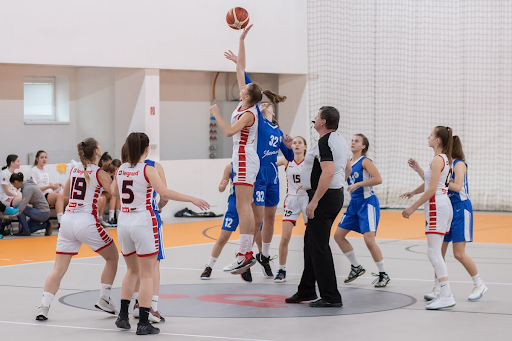Are High School Sports Worth It?

(photo source: PEXELS)
November 2, 2022
The high school experience is the four years in your life where you are told to constantly make the most out of it. High school sports are tied to the concept of living fully during your years in high school.
Lots of high school students feel immense pressure to be part of a sports team resulting in a decent amount of the school partaking in them. It is seen as a place where people come together and bond while exercising and participating in an activity they love. As great as they may appear, so many people dread their sport.
Most student-athletes grew up playing their sport. They loved the sport and saw it as a break from reality. As they grew up, more pressure was applied and this seemingly fun thing now was one of the main stressors in their lives. Why is it that sometimes high school athletes seem to lose their care and love for their sport?
This is not to take away from those who really do love their sports and see them as a passion. But recently, too many people view it as a negative thing rather than in the positive way it is intended for. High school sports have shaped into what seems to feel like an obligation.
Pressure
High school tends to come with a lot of pressure. Pressure socially, pressure academically, pressure with sports or activities. This pressure can sprout from one’s family, friends, or just from themselves. This is another huge aspect of high school sports.
Sometimes people just do a sport to do one. It is not certain if this is positive or negative, but sports do offer many positive benefits, like exercise.
Senior Kaileigh Moriarty shares her personal experience of this pressure, “I feel the need to play a high school sport because everyone around me does. People tend to get cliquey with their sports and I did not want to feel left out.”
Students feel pressure to play a sport because those around them are. People, especially high school students, tend to worry about inclusion. When everyone around you plays a sport, but you don’t, you could feel excluded. This does not mean you should or that you are, it is just human nature.
In many cases, this sense of pressure comes from students’ families. The reasoning behind this is usually the social or the exercise aspect. Parents and guardians want what is best for their children, but they do not always know what is best for them. Sports are seen as an opportunity to stay active and in shape. To some parents, this is extremely important for their child, pushing them to do a sport.
Obviously, high school sports are not the only way to exercise. Many people find other alternatives, like going for walks or runs. Going to the gym is another very practical way to stay in shape and be active.
Most high schoolers face the extreme stress of college. In order to create well-rounded applications, students are often encouraged to show their participation in a variety of activities. This does not just have to be sports, in many cases it is not. But a majority of students, who may lack talent, skill, or interest in other programs turn to sports as a way to appeal to college.
Moriarty shares her experiences, “College and having enough extracurriculars definitely is important to me. I have been thinking about it for the past couple of years. I did not do a sport my junior year and one of the reasons I did one this year was for my college applications.”
Another component of pressure is the pressure they apply once they decide to do the sport. The practice schedule is draining and demanding. Every day after school and sometimes throughout the weekend is dedicated to their sport. They are expected to push themselves to the limit and be the very best they can be.
The Social Aspect
It is pretty obvious that during sports seasons people tend to get closer to their teammates. They spend almost every day after school together, so this leads to a bond. Teammates also get closer because they can talk to each other about their team, practices, and games. This can lead to those who do not play a sport feeling left out.
Pentucket Senior Michelle Daley adds her insight on this, “I do not think your friends really are based on what sports you play. Well, obviously I am closer with people on the cheer team during cheer season, but I still am close with people who do not play a sport or play a sport that I don’t.”
As we can see from Daley’s opinion, sports are definitely not the only means of friendship. It may make it easier to make friends, but just because someone is not your teammate that does not mean the friendship is affected. What sport someone plays or if they even play one at all definitely does not necessarily have an impact on their social life.
As mentioned earlier, another part of sports that sparks parents’ or guardians’ attention is the social aspect. High school sports give students the opportunity to be around their peers. They have the ability to meet new people and just socialize in general.
The Stress and Dread
However, many students face injuries and general health problems from their sports. Athletes struggle with injuries that are constantly reinjured due to their commitment to their sport.
In many cases, high school sports involve certain levels of inexperience. This leads to a bigger safety risk. These injuries, especially concussions, can result in them falling behind academically. Injuries can lead to student-athletes being more overwhelmed and anxiety-ridden.
Many athletes overtrain. Often they practice too much and too hard. Since it is at the high school level, their safety is not always guaranteed. Student-athletes’ days consist of going to school for almost seven hours and then having a two and half hours of practice or game.
Some sports have more pressure than others. Nonetheless, all athletes are pushed very hard. Those who do not sustain serious injuries are still often left with pain and soreness constantly. Is this worth it for something you do not enjoy?
Is it worth playing a sport if you constantly are dreading it? Not everyone falls under this category, but many student-athletes feel this way. They struggle to see the fun in their sport and instead see it as an obligation.
Senior Courtney Lynch offers her insight, “I would not say I hate my sport, it is just a lot. It adds a lot of stress to my life and I sometimes even catch myself looking forward to the off-season. But at the same time, I love it and could never imagine not doing it.”
Not everyone feels the same way about their sports being too much, but many high schoolers would agree with Courtney. They could never even imagine quitting, yet they still are full of stress. Some even love their sports but still think the stress is too extreme.
Some people live for their sports and would never want to quit, but a lot of people do not do the sport out of enjoyment. Is your sport really worth it if you do not love or enjoy it?











Caitlin Armao • Nov 3, 2022 at 2:12 pm
Kiki summed up many feelings about high school sports that I have also felt. The layout of the article allows for an easy and enjoyable read. These are feelings that many athletes find hard to admit but this article is normalizing the feelings. The pressure and social standard to play a sport are very relatable. Kiki had a well-developed and interesting article.